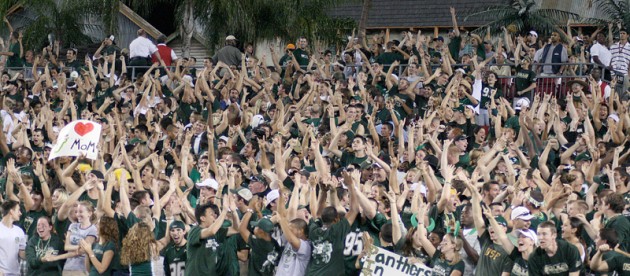Arrests at Bulls football games skyrocket

Keg bans, tailgating reductions and a bolstered police presence on game day resulted in three and a half times as many arrests during the USF-Pittsburgh game than during the USF-Kansas game.
There were 48 arrests total, compared to the two people arrested at USF’s season opener against Tennessee-Martin, University and stadium officials said.
The sobering truth? The majority of these arrests (35) involved underage drinking, Tampa Sports Authority (TSA) Director of Operations Mickey Farrell said.
“It doesn’t surprise me all that much,” Dean of Students Kevin Banks said. “With more eyes in the parking lot, more people are going to be reported.”
Amid articles, blogs and message board posts denouncing USF football fans as unruly and ill-mannered following the Kansas game, the University and TSA — the company that manages Raymond James Stadium — decided to tighten restrictions during football games, particularly those regarding alcohol.
As a result, eight additional officers were split into teams to patrol the area, all looking for evidence of overly intoxicated people, kegs smuggled into the stadium and underage drinking.
More patrolling, more arrests
In addition to the arrests, the game had 65 ejections, 20 of which occurred before the fans even made it into the stadium. For the most part, these fans were ejected for being intoxicated, Farrell said. No kegs or other large bottles of alcohol were confiscated.
USF isn’t alone in banning kegs and limiting tailgating times — the University of Miami, which also plays in a professional stadium, has the same policies.
Division of Alcoholic Beverages and Tobacco members also helped increase the number of eyes patrolling the parking lots, showing up as soon as the lots opened rather than two hours before the game, as in the past. This practice should continue for the rest of the season, Farrell said.
Though the 113 arrests and ejections are a significant climb from the 76 people arrested and ejected from the Kansas game, which spurred TSA and the University’s actions, Farrell said he hopes the number will decrease over time as students get used to this patrolling system and learn that they can’t get away with being drunk and disorderly on the stadium’s property.
TSA spokeswoman Barbara Casey said arresting and ejecting more people in violation of the law, as well as those in violation of TSA and University guidelines, would create a better night for the majority of the fans in attendance.
“We want everybody to have a good experience at the game, and in order to do that, you have to look at all angle,” she said. “If what you’re doing is interfering with someone else’s enjoyment of the experience, that’s not fair to them.”
Along with the additional officers, Banks said cards distributed by Respect-a-Bull volunteers could have played a role in the increased arrests and ejections. Each card was printed with special phone and text message numbers so fans could report any instance of poor conduct — such as fighting, cursing or throwing objects at others — to the authorities.
Banks said he was unsure whether any of these calls resulted in the ejection or arrest of a fan.
For the Homecoming game against Syracuse, Banks said he hopes to have more Respect-a-Bull volunteers on hand and more people looking out for inappropriate behavior.
Students largely not to blame
Though adolescents make up a large portion of the arrests, Banks and Farrell said most of those arrested aren’t USF students. Instead, they tend to be recent alumni or young Bulls fans, he said.
“Even at the Kansas game, I think there was something like 20 students involved within 76 arrests and ejections,” he said. “I don’t know how many are involved with this game, though.”
Officers typically try to report whether a person arrested or ejected is a student. All students are then referred to the Office of Student Rights and Responsibilities, which then verifies the offender’s affiliation with the University and determines whether an appointment is necessary to discuss the occurrence, said Maria Zale, interim director of the Office of Student Rights and Responsibilities.
“We hold this meeting to hear the student’s side of the story, and from there determine if the student has violated the student code of conduct,” she said.
Each arrest and ejection is handled on a case-by-case basis, and meetings to address student infractions from the Kansas game are ongoing. As for the Pittsburgh game, USF officials are in the process of verifying whether the offenders were students.
“These arrests have increased our caseload, I’ll tell you that,” Banks said.
Policies going too far?
Some students are concerned that TSA and the University are taking these rules too far, however.
“It’s making a football game feel more like going to church,” business major Cassius Upton said.
Upton said he spent part of the Kansas game in a holding cell after police officers caught him throwing a paper airplane and that he was removed from the game without warning.
“We have a policy against throwing objects of any kind,” Casey said. “A paper plane may seem innocent enough, but if it goes on the field it can be a distraction, and that’s the reason we’re all here, to see the game.”
Many universities, such as the University of Florida and the University of Central Florida, have similar policies. Though USF fans may have seen people throwing paper airplanes during the North Carolina State University away game, NCSU Police Capt. Jon Barnwell said North Carolina state statutes prohibit such an action, and that any fan caught doing so was arrested.
Overall, Casey said she hasn’t heard of many complaints from USF fans regarding the new policies.
“After spending 17 years here, people let you know when there’s a problem,” she said.






